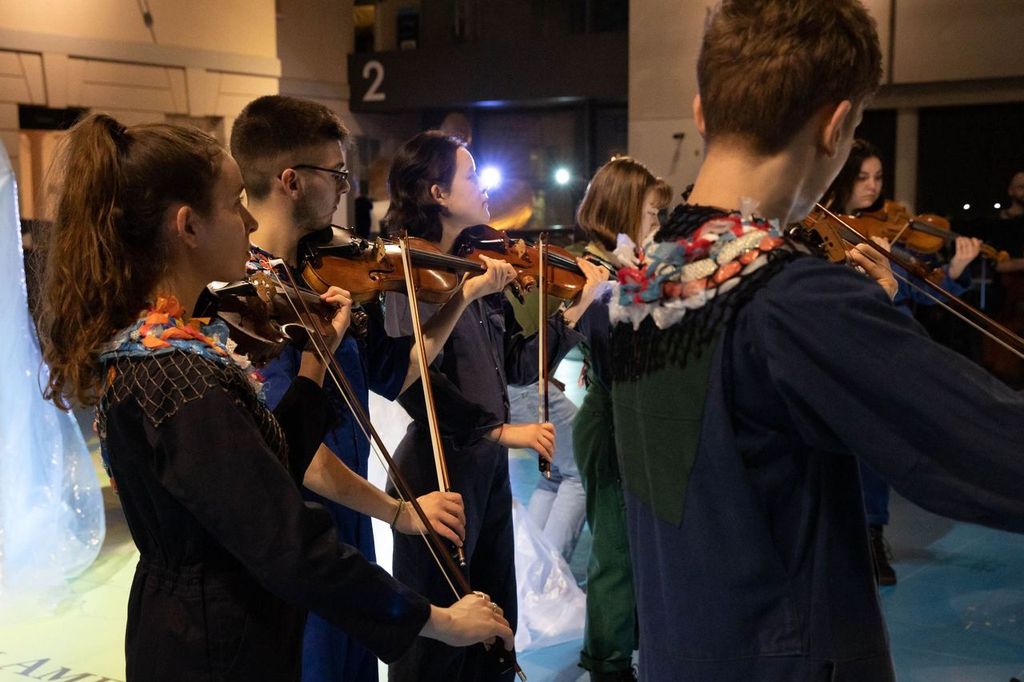Talia Erdal has never let success stop her from perfecting her art. Although she had to take a year off from her orchestral job in Israel to join Trinity Laban Conservatoire of Music and Dance, she snapped up the chance to stay ahead of the ever-evolving, diverse world of music. “It was an opportunity for me to focus again on practising, being creative, and improving as a cellist and musician,” she explains.
Erdal loved the freedom of her Trinity Laban one-year Independent Study programme. She was encouraged to explore her interests while advancing her existing knowledge. In this, she was able to explore composition before eventually writing, recording and publishing pieces alongside other musicians.
“This isn’t the kind of school where people are trained to be musicians who only play competitions and are just great instrumentalists; instead, they really try to develop musicians with broader horizons,” says Erdal, who today thrives in a range of areas. She is an active composer, arranger and singer, performing her music in classical and non-classical venues while writing for theatre and dance.
Success stories like hers are standard at Trinity Laban’s Strings Department. Several factors ensure students realise their artistic potential to secure fulfilling and sustainable careers in music. Its performance programmes focus on chamber music and collaboration, developing essential skills for 21st century musicians. It teaches them to truly listen while improving their performance skills. What better way to do so than through quality experiences? Thankfully, the Conservatoire offers just that in abundance.
For example, in Spring 2022, Trinity Laban’s String Ensemble banded together in response to the climate crisis. Through the juxtaposition of Vivaldi’s iconic masterpiece, “The Four Seasons,” and the immersive sound world of Trinity Laban graduate Hollie Harding’s “Melting, Shifting, Liquid World,” the thought-provoking programme explored the seasons as they should be and as they may become.
Harding’s piece combined a live string ensemble and solo electric viola with a pre-recorded soundtrack delivered to the audience through bone-conduction open-ear headphones. It was conceptualised to enable listeners to fully immerse themselves in the sound world while moving through the orchestra and exploring their surroundings.
Following its launch performance at the National Maritime Museum, Royal Museums Greenwich in March 2022, “A Change of Season” toured to Manchester, Sussex and the Latitude Festival, Suffolk in July 2022. The production is a prime example of how students at London’s creative conservatoire leverage their creative art forms as a tool for change while proving that art can carry strong messages into everyday consciousness.
Experts show them how. Students here receive extensive coaching from both in-house staff and three visiting Carne Trust Ensembles: the Smith Quartet, the Carducci Quartet and the Linos Piano Trio — each of which grace the school twice a year to perform and conduct masterclasses. International ensembles like the Kronos and Kopelman Quartets as well as the Quatuor Mosaïques also visit Trinity Laban as guest artists. Their varying perspectives play a vital role in developing multidisciplinary visionaries.
“In the ever-evolving world of professional music, our string players combine technical mastery with an innovative, entrepreneurial and collaborative spirit,” explains Head of Strings, Professor Nic Pendlebury. “We will help you become the very best musician you can be, enabling you to develop an enquiring musical mind and the technical mastery necessary to flourish as an artist in the 21st century.”
Trinity Laban Strings alumni can be found gracefully navigating the ever-changing arts industry in several of the world’s top international orchestras such as the Berlin Philharmonic, the Belgrade Symphony Orchestra, and closer to home — the BBC Symphony Orchestra, the Liverpool Philharmonic and the Philharmonia, to name but a few.
Others can be found in celebrated ensembles including the Carducci Quartet and The Jubilee String Quartet. Solo careers are an option for students too — they would follow in the footsteps of Stjepan Hauser of 2 Cellos, violinist Lana Trotovšek and harpist Claire Iselin.
Trinity Laban is one of the UK’s top institutions for graduate employability, as consistently listed by the Higher Education Statistics Agency. So whether your calling is to be an acclaimed soloist, a principal player in a top orchestra, a chamber musician, a cross-arts collaborator, an educator, or the CEO of a record label; Trinity Laban has all the tools, resources and inspiration you could ever need to truly contribute to the creative arts.
“During my four years, I learnt a vast amount, not just from my brilliant teachers but also fellow students,” says graduate Tom Beer, Principle Viola at the Bournemouth Symphony Orchestra. “I had the space and the opportunities to develop both as an instrumentalist and more generally as a musician. The skills I acquired, the music I heard, the personalities that inspired me and the friendships I made have shaped the rest of my life.”
Click here to pick your pick from an expansive lineup of Strings programmes and apply for entry in 2023.
Follow Trinity Laban Conservatoire of Music and Dance on Facebook, Twitter and YouTube











